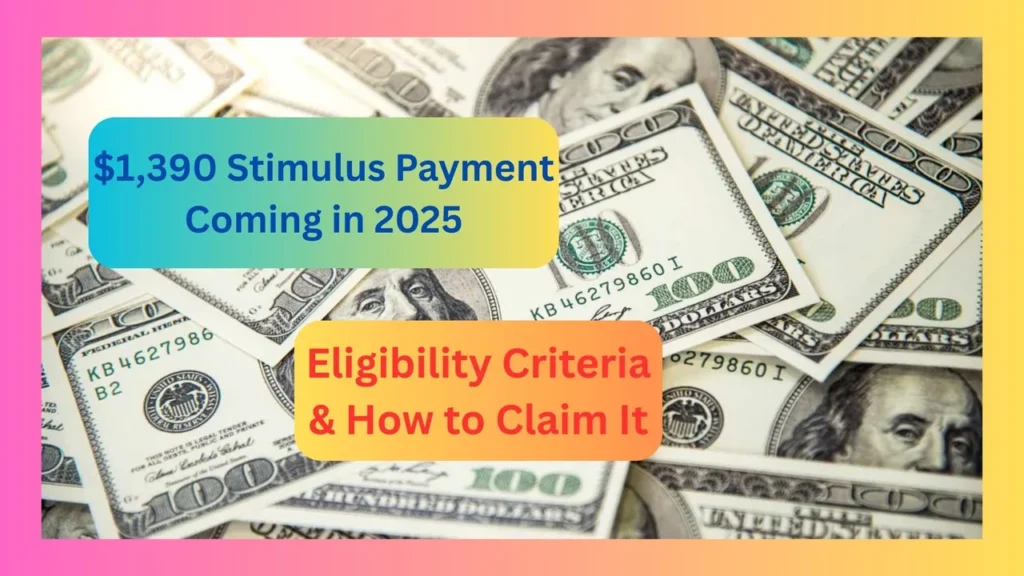Introduction
Did you miss out on the third round of COVID-19 stimulus checks back in 2021? Well, here’s some good news: the IRS is offering a final opportunity to claim up to $1,400 through the Recovery Rebate Credit. But you need to act fast—the deadline is April 15, 2025.
In this guide, we’ll break down everything you need to know about this stimulus payment, including eligibility criteria, how to claim it, and answers to common questions.

Understanding the Recovery Rebate Credit
The Recovery Rebate Credit is a refundable tax credit for individuals who didn’t receive the full amount of the third Economic Impact Payment (EIP) issued in 2021. This credit allows eligible taxpayers to claim the missing amount on their 2021 tax return.
Who Is Eligible for the $1,390 Stimulus Payment?
To qualify for the Recovery Rebate Credit:
1. Income Requirements
- Single Filers: Adjusted Gross Income (AGI) up to $75,000.
- Married Filing Jointly: AGI up to $150,000.
- Head of Household: AGI up to $112,500.
Payments phase out above these thresholds and are unavailable to individuals earning $80,000 or more, or couples earning $160,000 or more.
2. Non-Filers
If you didn’t file a 2021 tax return, you might still be eligible. The IRS estimates that about 1.1 million people didn’t file their 2021 tax returns and may be eligible for the stimulus check, tax refund, or both.
How to Claim Your Stimulus Payment
1. File Your 2021 Tax Return
Even if you had little or no income in 2021, you should file a tax return to claim the Recovery Rebate Credit. The IRS has a three-year deadline to claim a refund on tax returns, making April 15, 2025, the last day to file for the 2021 tax year.
2. Automatic Payments
For those who filed their 2021 tax returns but didn’t claim the Recovery Rebate Credit, the IRS has been issuing automatic payments. These payments, up to $1,400 per individual, are sent to the bank account listed on the taxpayer’s 2023 tax return or mailed to the address on record.
Common Reasons for Missing the Original Payment
- Income Changes: Your income in 2021 may have made you eligible, even if you weren’t in previous years.
- Dependency Status: Changes in the number of dependents can affect eligibility.
- Non-Filing: Not filing a tax return in 2021 means the IRS didn’t have the necessary information to issue the payment.
Conclusion
The $1,390 stimulus payment in 2025 is a valuable opportunity for those who missed out on the third round of Economic Impact Payments. By understanding the eligibility criteria and taking prompt action to file your 2021 tax return, you can claim the Recovery Rebate Credit before the April 15, 2025 deadline.
Frequently Asked Questions (FAQs)
Q1: What is the Recovery Rebate Credit?
A: It’s a refundable tax credit for individuals who didn’t receive the full amount of the third Economic Impact Payment in 2021.
Q2: How do I know if I received the third Economic Impact Payment?
A: You can check your IRS online account to view the total of your Economic Impact Payments.
Q3: What if I didn’t file a tax return in 2021?
A: You can still file your 2021 tax return by April 15, 2025, to claim the Recovery Rebate Credit.
Q4: Will the stimulus payment affect my other benefits?
A: No, receiving the stimulus payment does not affect your eligibility for assistance from other government programs such as Medicare, SSI, or SNAP.
Q5: How will I receive the payment?
A: Payments are sent via direct deposit to the bank account listed on your 2023 tax return or mailed to the address on record.